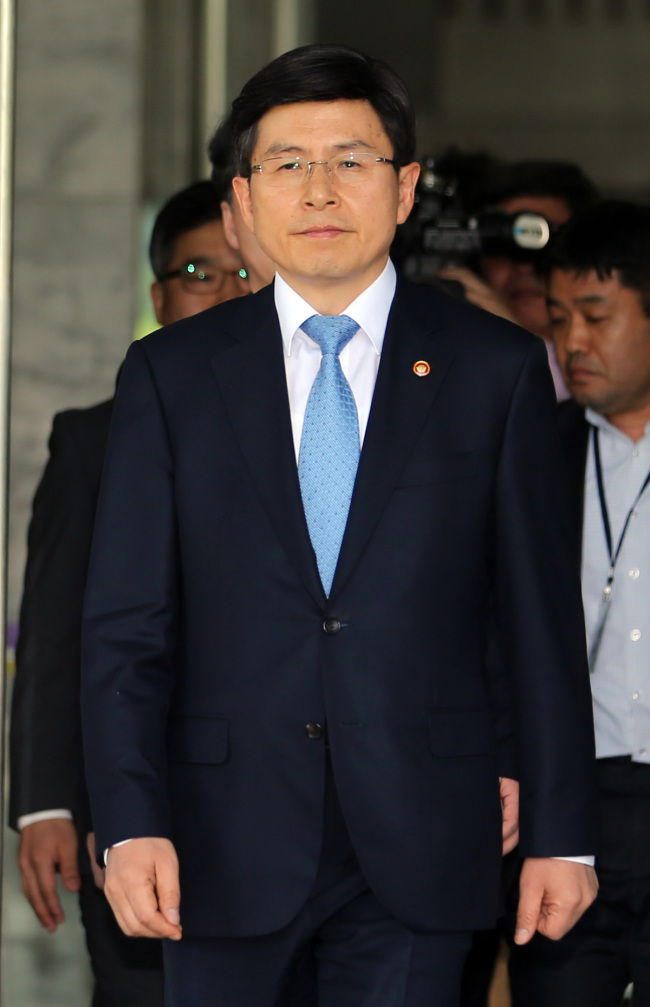Hwang Kyo-ahn, the nominee for South Korea’s new prime minister, is expected to face a daunting task of proving his capability to serve as the nation’s No. 2 during his parliamentary confirmation hearing, with the opposition blocs already voicing concerns about what they alleged as his unbalanced political views.
President Park Geun-hye designated current Justice Minister Hwang on Thursday to fill the prime minister’s post left vacant for nearly a month by ruling Saenuri Party’s Rep. Lee Wan-koo who stepped down amid a spiraling graft scandal surrounding deceased business tycoon Sung Woan-jong. Lee was suspected of receiving illicit political funds from Sung, the former chairman of Keangnam Enterprises.
Born in 1957, Hwang has held key posts within the prosecution throughout his 28-year career as a public prosecutor until he joined the Park administration as justice minister in 2013. He investigated several cases related to national security, earning a nickname “Mr. National Security Law” for his expertise in the area.
 |
Hwang Kyo-ahn |
One of the cases involves self-confessed North Korean agent Kim Hyun-hee, who was convicted of bombing a Korean Air Lines flight near Myanmar, killing all 115 people on board. He also investigated Rep. Lim Su-kyung of the main opposition New Politics Alliance for Democracy when the former pro-unification activist made an unauthorized trip to North Korea in 1989.
Hwang’s past career and his conservative views on national security, however, will likely face stiff criticism from the opposition bloc, hinting at tough grilling sessions at the upcoming parliamentary hearing.
“President Park Geun-hye naming Minister Hwang is an overt declaration that she would reign over the country with a public security-focused (government),” NPAD senior spokesman Rep. Kim Yung-rok said.
The NPAD floor leader Rep. Lee Jong-kul also said that Hwang is far from being a leader who can communicate with people and forge national unity.
“He is the one who asked the court to dissolve the opposition parties. He ignored the opposition bloc as well as the people,” Lee said, referring to Hwang’s part in leading the dissolution of a minor progressive party and the arrest of its former leftist lawmaker Lee Seok-ki for its pro-North Korea activities while serving as justice minister.
“This nomination overlooks the (views) of the opposition and the people. It is worrisome how we, the opposition party, should deal with the (government) control based on force and oppression in the future,” Lee said.
Hwang was accused of exerting undue influence on the investigation into the National Intelligence Service’s meddling in the 2012 presidential election to prevent any finding that would hurt President Park. Led by the spy agency’s former director Won Sei-hoon, it allegedly conducted an online campaign to help then-presidential candidate Park win the election.
He created a stir after making remarks about how he believed a probe was viable regarding the former Roh Moo-hyun administration’s alleged link to the Sung Woan-jong scandal at a parliamentary committee, which the opposition lawmakers saw as his attempt to affect the ongoing probe.
In light of the suspicions over Hwang’s actions, the main opposition NPAD submitted a motion to the National Assembly to dismiss him in November 2013 and February 2014.
Hwang’s 17-month stint at a local law firm in 2011 with a lofty paycheck and his exemption from the mandatory military service are also expected to come under close scrutiny.
Despite the concerns, the ruling Saenuri Party chairman Rep. Kim Moo-sung hailed Hwang as “the right person.”
“Hwang is fit for the post to support President Park in her drive to root out corruption and make our society transparent,” he said, vowing to hold a parliamentary hearing at the earliest possible.
By Ock Hyun-ju (
laeticia.ock@heraldcorp.com)








![[Today’s K-pop] Blackpink’s Jennie, Lisa invited to Coachella as solo acts](http://res.heraldm.com/phpwas/restmb_idxmake.php?idx=644&simg=/content/image/2024/11/21/20241121050099_0.jpg)